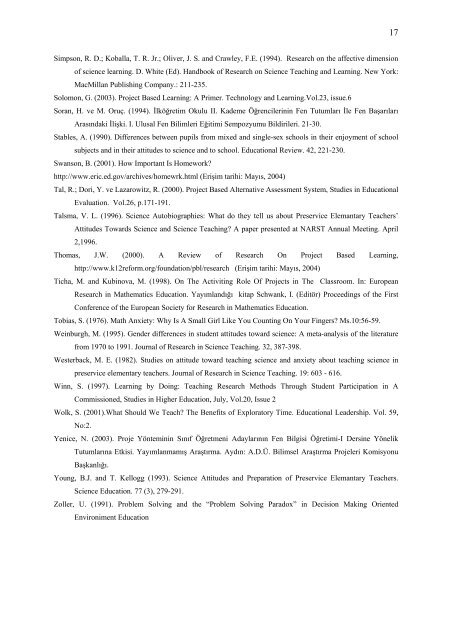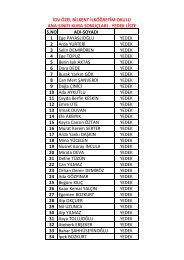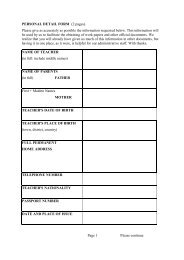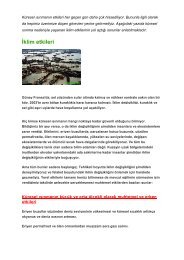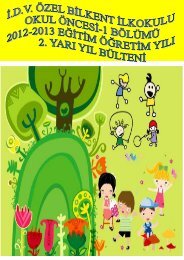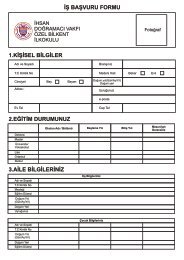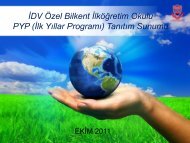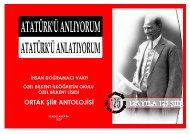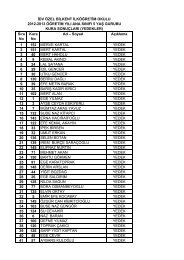1 ilköğretimde proje tabanlı öğrenmenin yeri - Özel Bilkent İlköğretim ...
1 ilköğretimde proje tabanlı öğrenmenin yeri - Özel Bilkent İlköğretim ...
1 ilköğretimde proje tabanlı öğrenmenin yeri - Özel Bilkent İlköğretim ...
Create successful ePaper yourself
Turn your PDF publications into a flip-book with our unique Google optimized e-Paper software.
Simpson, R. D.; Koballa, T. R. Jr.; Oliver, J. S. and Crawley, F.E. (1994). Research on the affective dimension<br />
of science learning. D. White (Ed). Handbook of Research on Science Teaching and Learning. New York:<br />
MacMillan Publishing Company.: 211-235.<br />
Solomon, G. (2003). Project Based Learning: A Primer. Technology and Learning.Vol.23, issue.6<br />
Soran, H. ve M. Oruç. (1994). <strong>İlköğretim</strong> Okulu II. Kademe Öğrencilerinin Fen Tutumları İle Fen Başarıları<br />
Arasındaki İlişki. I. Ulusal Fen Bilimleri Eğitimi Sempozyumu Bildirileri. 21-30.<br />
Stables, A. (1990). Differences between pupils from mixed and single-sex schools in their enjoyment of school<br />
subjects and in their attitudes to science and to school. Educational Review. 42, 221-230.<br />
Swanson, B. (2001). How Important Is Homework?<br />
http://www.eric.ed.gov/archives/homewrk.html (Erişim tarihi: Mayıs, 2004)<br />
Tal, R.; Dori, Y. ve Lazarowitz, R. (2000). Project Based Alternative Assessment System, Studies in Educational<br />
Evaluation. Vol.26, p.171-191.<br />
Talsma, V. L. (1996). Science Autobiographies: What do they tell us about Preservice Elemantary Teachers’<br />
Attitudes Towards Science and Science Teaching? A paper presented at NARST Annual Meeting. April<br />
2,1996.<br />
Thomas, J.W. (2000). A Review of Research On Project Based Learning,<br />
http://www.k12reform.org/foundation/pbl/research (Erişim tarihi: Mayıs, 2004)<br />
Ticha, M. and Kubinova, M. (1998). On The Activiting Role Of Projects in The Classroom. In: European<br />
Research in Mathematics Education. Yayımlandığı kitap Schwank, I. (Editör) Proceedings of the First<br />
Conference of the European Society for Research in Mathematics Education.<br />
Tobias, S. (1976). Math Anxiety: Why Is A Small Girl Like You Counting On Your Fingers? Ms.10:56-59.<br />
Weinburgh, M. (1995). Gender differences in student attitudes toward science: A meta-analysis of the literature<br />
from 1970 to 1991. Journal of Research in Science Teaching. 32, 387-398.<br />
Westerback, M. E. (1982). Studies on attitude toward teaching science and anxiety about teaching science in<br />
preservice elementary teachers. Journal of Research in Science Teaching. 19: 603 - 616.<br />
Winn, S. (1997). Learning by Doing: Teaching Research Methods Through Student Participation in A<br />
Commissioned, Studies in Higher Education, July, Vol.20, Issue 2<br />
Wolk, S. (2001).What Should We Teach? The Benefits of Exploratory Time. Educational Leadership. Vol. 59,<br />
No:2.<br />
Yenice, N. (2003). Proje Yönteminin Sınıf Öğretmeni Adaylarının Fen Bilgisi Öğretimi-I Dersine Yönelik<br />
Tutumlarına Etkisi. Yayımlanmamış Araştırma. Aydın: A.D.Ü. Bilimsel Araştırma Projeleri Komisyonu<br />
Başkanlığı.<br />
Young, B.J. and T. Kellogg (1993). Science Attitudes and Preparation of Preservice Elemantary Teachers.<br />
Science Education. 77 (3), 279-291.<br />
Zoller, U. (1991). Problem Solving and the “Problem Solving Paradox” in Decision Making Oriented<br />
Environiment Education<br />
17


